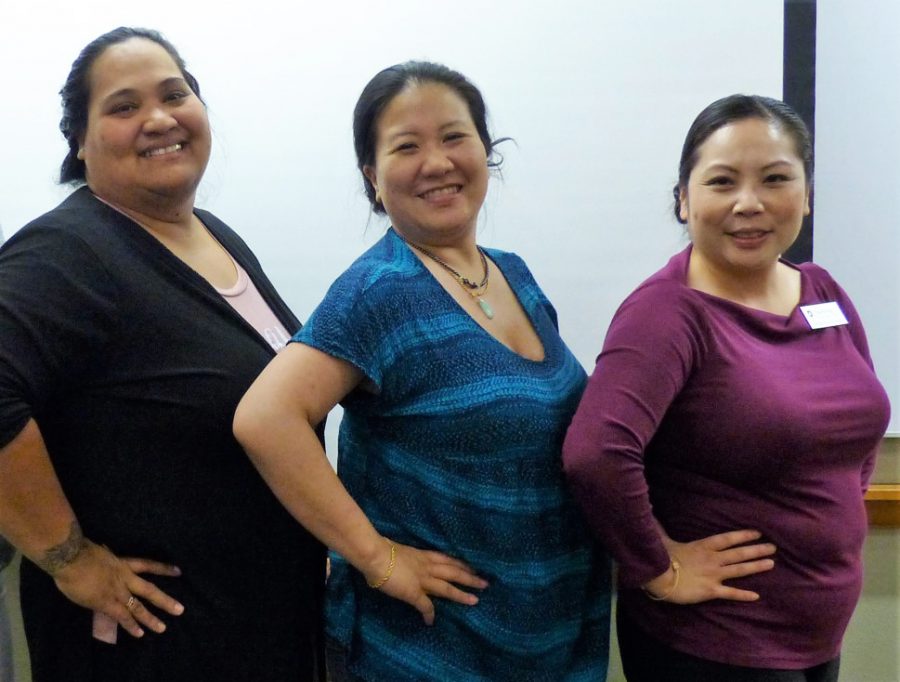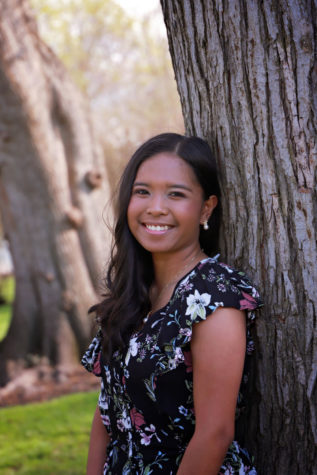Grants fund community-driven research
WSU investigators learn from ‘parent leaders,’ work on public policy changes
COURTESY OF WSU COLLEGE OF NURSING
Kapiolani Micky, of the Micronesian Islander Community Organization, left; Principal Investigator Jacqueline Leung, middle, board chair of the organization; and Principal Investigator Connie Nguyen-Truong, assistant professor at the WSU College of Nursing in Vancouver, right, lead the project and work with parent leaders.
January 15, 2020
Two new grants will help expand an Oregon-based program that uses community-focused participatory research to empower Micronesian parent leaders.
WSU and the Micronesian Islander Community organization partnered up and began their research in 2018. The research team consists of principal investigators Jackie Leung, MIC board chair, and Connie Kim Yen Nguyen-Truong, WSU College of Nursing assistant professor. Kapiolani Micky, MIC program coordinator and community health worker, is a member as well.
The team received two additional grants last fall to expand their work. They received a $20,000 grant from the Asian Pacific American Network of Oregon Communities United Fund (Coulter Foundation). The Health and Education Fund Partners (CareOregon, Kaiser Permanente Northwest, Meyer Memorial Trust and Oregon Community Foundation) awarded the team a $125,000 grant, according to WSU Insider.
Leung said the first part of their project focused on working with parents who have children between the ages of zero and eight. It was open to anyone who identified as Micronesian and who is also a parent. Research participants are called parent leaders.
Nguyen-Truong said the team learned through storytelling, which meant having deep and authentic conversations with the parent leaders. The conversations they had taught them a lot about the Micronesian community.
“We learned from the parent leaders about Micronesians and [that] there’s a shy and humble culture not accustomed to speaking about issues including around health and education, and specifically around reproductive and prenatal care,” she said.
Parent leaders were able to mentor each other and see the power in their stories, Nguyen-Truong said.
“We are entering that stage where the parent leaders are the experts… and that we’re here to fully, actively listen and be a part in facilitating in-depth discussions around what they think would be solutions,” she said.
Leung said parent leaders identified challenges and needs in the Micronesian Islander community, which helped drive their research. She said the purpose of their work is to empower the participants to become leaders within their communities.
Parent leaders celebrated their graduation in September 2019, Leung said. At least half of those parent leaders will continue to work with the team for the next phase of their work.
Through their grants, Leung said they will expand their work based upon the needs and strategies parent leaders identified. One of the needs mentioned is to have two meetings per month and to incorporate more public speaking and testimony-sharing opportunities.
Nguyen-Truong said one of the strategies that was identified was to connect community members to local resources they did not know existed. Encouraging community members to acquire skills in public policy and leadership is part of their expansion goal as well.
Another strategy is to develop mutual support by creating new parent clubs and interest groups in schools. She said this will lead to structural changes in the school system that will benefit the Micronesian Islander community.
“It’s truly data-driven, and the parent leaders, they’re the ones that tell the story and honing what their story means, so it’s really about their voices,” Nguyen-Truong said.












